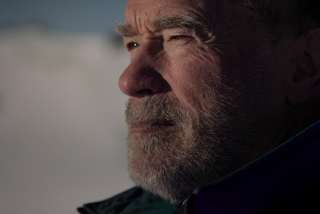The Art of Saying Nothing When Everything Counts
Many people are complaining about media coverage of the national crisis centering on an alleged affair between President Clinton and former White House intern Monica Lewinsky. They agree that the story is big but believe much of the coverage has been excessive, even extreme, to the point of creating news when it doesn’t exist.
That is untrue. I offer as evidence, for those who dare believe it, the following transcripts of television interviews that I received over the transom.
Reporter: And Billy, you knew Monica Lewinsky when you and she were in the same second-grade class, is that right? And you were president of your second-grade class?
Billy: Yes, that’s right.
Reporter: Did she strike you then as the kind of person who would lie about an affair with the president of the United States?
Billy: Well, she once lied to me about borrowing my eraser.
Reporter: Anything else about her stand out for you?
Billy: Well, I remember one day she brought Barbie and Ken to class for show and tell.
Reporter: Did she seem to be more interested in Ken than Barbie?
Billy: She sure didn’t ignore him.
Reporter: I see. Well, what was Monica like then?
Billy: Just an ordinary kid like the rest of us. Except. . . .
Reporter: Except?
Billy: She liked to draw a lot with crayons.
Reporter: With crayons? Is there a possibility that she thought of a crayon as a phallic symbol?
Billy: Well, she never came out and said that, but you can draw your own conclusions.
Reporter: Did she grasp the crayon in a distinctive way? Hold it tightly or anything like that? Or seem to get a lot of joy out of holding it? Did she groan with pleasure at any point?
Billy: Well, she seemed to enjoy drawing.
Reporter: Enjoyed drawing? And did you see what she drew?
Billy: Well, she once drew a picture of Big Bird.
Reporter: Big Bird, the “Sesame Street” character. An older, taller authority figure that she seemed to admire and perhaps even be obsessive about?
Billy: As I recall, I didn’t think much of it at the time. But now it does seem real weird.
Reporter: And when you sat behind her, did you notice her being starry-eyed around you or seeming to get a particular thrill from being close to you because you were class president?
Billy: Well, she did giggle a lot.
Reporter: I see. Did she dress provocatively around you?
Billy: As I recall, she wore short skirts. And no bra.
Reporter: I see. Lots of flesh and bra-less. Did she ever turn around and, you know, come on to you?
Billy: Well, that was something I generally discouraged.
Reporter: If you could say something to Monica, right now, what would that be?
Billy: Uh, return my eraser?
Reporter: Billy, former confidant of Monica Lewinsky, the woman at the center of the White House crisis. Thanks for dropping by and sharing your insights.
*
Studio Host: Professor Smart, your specialty is hearing what isn’t said. On Thursday, professor, Vernon Jordan stated, “I want to say absolutely and unequivocally that Ms. Lewinsky told me in no uncertain terms that she did not have a sexual relationship with the president.” Professor, what did you hear?
Smart: I heard Jordan say, “I want to say,” not that he’s saying it. This could mean it’s something he’d like to say but can’t.
Host: So Jordan has said nothing.
Smart: Quite possibly. And I also want to return to the tense problem. Jordan said Ms. Lewinsky told him she did not have a sexual relationship with the president. Note the use of past tense, leaving open the possibility that she is presently sleeping with the president or may consider doing so in the future--if not with this president, a future president.
Host: So she also has said nothing.
Smart: Quite possibly. And note that in saying “quite possibly,” I, too, am hedging and, in effect, saying nothing.
Host: Which means this entire interview is meaningless?
Smart: Exactly. On that I can be definitive.
Continuing this defense of the media, let’s now address criticism of the CBS News program “This Morning” for including Martha Stewart in the team it had covering Cuba last week. Critics who insisted that Stewart would not be able to impose her brand of style on Cuba are proved wrong by the following excerpt of her report on rural Cuba.
Martha: I’m out in the fields with Jose, and see what I’ve done to the kerchief around his neck. The one he was wearing was quite nice, but I’ve replaced it with a brilliant kelly green one that picks up the color of the lush foliage, making for a coordinated look that I think he’ll enjoy. And what I’ve also done is give the kerchief a 25-degree twist, something quite subtle, just to give it a little panache. Isn’t that nice, Jose?
Jose: Si.
Martha: Now, we’re going inside Jose’s little house here, which is very cozy and compact. But I felt it needed a little dash of something to lift the spirits of Jose and his wife, Maria, after a long day. So what I’m doing here is taking these sugar stalks from his own fields, which I’ve cut into long, thin strips, and arranging them in this lovely crystal vase that I’ve brought from New York, and making a delightful centerpiece for their dinner table. I’ll be taking back the vase, but with a little bit of creativity, this arrangement will look just as attractive in the paper sack that I’m leaving behind. That works nicely, don’t you think, Maria?
Maria: Si.
Martha: Now, let’s feed those chickens.
More to Read
Sign up for Essential California
The most important California stories and recommendations in your inbox every morning.
You may occasionally receive promotional content from the Los Angeles Times.










